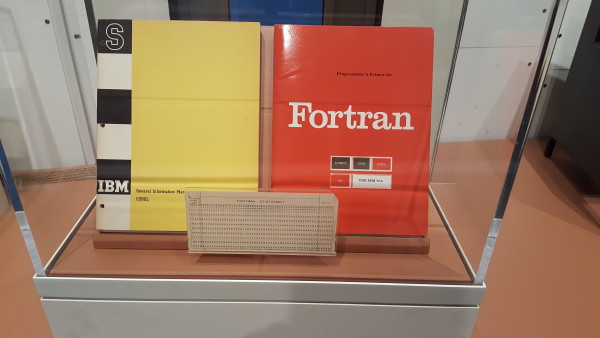Silicon City
The New York Historical Society’s Silicon City exhibit opened last week and I went yesterday with my daughters who are in their early/mid 20s now.
If you are a student of or have an appreciation for the history of technology, you will enjoy this exhibit. They have an early IBM computer which I’d never seen in person. There’s a ton on the history of IBM, the original NYC tech company, which I loved, including these manuals from the 1970s:
My oldest daughter asked me if I knew Basic. I told her that Basic was the first language I learned and Fortran was the second.
There was a nice mention of Grace Hopper, one of the early computer scientists and one of the authors of the Cobol programming language. It was great to see my girls realize that women were at the forefront of computer science in the early days. That fact is lost on so many.
We also loved the videos on the early history of making art, music, and games on computers. If you came of age in this millennium, it’s mindblowing to see what a computer game looked like in the 60s and 70s. The videos on the early attempts to make art and music on computers are also particularly well done.
It ends with some videos about the re-emergence of the NYC tech sector in the 90s. I participated in the recording of oral histories along with some friends and colleagues from that era. It is fun to remember what the NYC tech scene was like in the mid 90s. It seems like yesterday but it was twenty years ago.
If you have kids who are into tech, they will enjoy this exhibit. And if you are a geek like me, you will too.

Comments (Archived):
buy anything?http://shop.nyhistory.org/c…i like this one;http://shop.nyhistory.org/c…reminds me of a Christmas present when i was a kid.
I did not
Nice–I’m going this week.Re: women and tech I’ve always loved this pic!http://awaldstein.tumblr.co…
That’s great
that’s a lot of code.Leicester University printed the first hard copy of the human genome code. 130 volumes, and 43,000 characters per page. in there somewhere is Shakespeare, Mozart, Picasso, and everyone and everything that humanity amounts to;
Congrats on the opening. It’s a bit of a blur for me, but I’m pretty sure I learned Fortran before Basic, and assembly language in-between.
Love NY history an tech history. Can’t wait to go this Thursday.I remember learning to program and operate an IBM 1130 using Fortran IV and punch cards in high school.https://en.wikipedia.org/wi…Sad thing was that the IBM 1130 was introduced in 1965 and I went to high school in the early 1980s 🙁
1984. Big bang changed everything. Vertical separation of AT&T paved way for commercial internet we know today. Albeit not at all in the way people expected.Computing history is all about trade-offs of processing, storage, transport across WAN/MAN/LAN and PAN. It’s about the trade-offs between layers 1-3 and who/what controls layers 4-7.
It’s great that it’s being done by the New York Historical Society. This will give Tech an exposure and credibility with a whole new audience
Important to remember that big companies were the roots of the tech scene in places like Silicon Valley too. Fairchild Republic, HP, etc. When we were graduating from college, working for IBM was a plum job. In Chicago, we have a ton of tech talent-but they are ensconced in high frequency trading firms for the moment. But, it’s changing.
AT&T and IBM. Both East Coast monopolies. Birth of digital revolutions? West Coast; now the home of the digital monopolies. Where will the dominant players of next revolution be?
Estonia?
Super interesting. Thank you Fred. What a huge impact this all have onto our lives today. I can remember very well that my father told me once lots of stories about his time as a young development engineer working for Siemens after the war building specialist scientific computers in the team of Konrad Zuse who has invented once the world’s first programmable computer https://en.wikipedia.org/wi…. That were exiting times and I am proud of my father who has served this industry his whole working life. He was a bit disappointed that both of his sons ‘only’ made MBAs and not followed his path :).
Though I hated learning COBOL on punch cards in 1983, it is cool to remember going in at 2am to run a deck… and replace bad cards after 20 minutes of compiling…
I coded in Frotran w Mr Fouchoux @ Prince Albert Collegiate Institute, 1978 I bet.